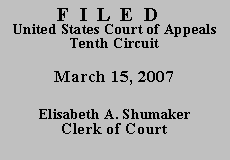

| UNITED STATES OF AMERICA, | No. 06-2115
(D.C. Nos. CIV-06-0047-JC/DJS and CR-96-571-JC) (D.N.M.) |
Rhoads pled guilty to one count of possession with intent to distribute one hundred grams or more of methamphetamine in violation of 21 U.S.C. § 841(b)(1)(B) and one count of using and carrying a firearm in relation to a drug trafficking crime in violation of 18 U.S.C. § 924(c). He was sentenced to 248 months' imprisonment and five years' supervised release. Although Rhoads did not appeal his conviction or sentence, he timely filed a motion under 28 U.S.C. § 2255 to vacate, set aside, or correct his sentence in federal district court in February 1999, which the district court denied on the merits.
In January 2006, Rhoads, proceeding pro se, filed a "Petition for Writ of Habeas Corpus[,] Petition for Writ of Audita Querela[,] [and] Motion to Preserve Rights Under Habeas Corpus," challenging the legality of his sentence. The district court denied this motion, and Rhoads now represented by counsel appeals. He argues that the court erred as a matter of law in (1) issuing an "internally-contradictory" memorandum that failed to articulate a rational reason for denying his petition, (2) recharacterizing his petition as a § 2255 motion, and (3) denying the recharacterized § 2255 motion for lack of subject matter jurisdiction.
To support his contention that the district court issued an internally inconsistent memorandum, Rhoads points to the court's statement that his petition may be brought only under § 2255 and its allegedly contradictory statement declining to recharacterize his petition as a § 2255 motion. We see no contradiction here. The court properly determined that the relief sought by Rhoads must be pursued under § 2255. See United States v. Torres, 282 F.3d 1241, 1245 (10th Cir. 2002) ("[A] writ of audita querela is not available to a petitioner when other remedies exist, such as a motion to vacate sentence under 28 U.S.C. § 2255.") (internal citations and quotations omitted). It then considered construing Rhoads' petition as a § 2255 motion, and permissibly declined to do so "because the applicable limitation period has long expired and Defendant previously filed a § 2255 motion." See United States v. Valadez-Camarena, 402 F.3d 1259, 1261 (2005) (holding that a district court does not abuse its discretion in declining to recast pleadings as a § 2255 motion when relief would be "facially barred as untimely . . . or as second or successive under 28 U.S.C. § 2255") (internal citation and quotation om itted).
Rhoads' remaining challenges to the district court's order rest on the assumption that the court proceeded to construe his petition as a motion under § 2255. This assumption misreads the court's decision. The court explicitly stated, "Defendant's motion will not be recharacterized as a § 2255 motion," and ruled, "Defendant's Petition for Writ of Habeas Corpus, Petition for Writ of Audita Querela, and Motion to Preserve Rights Under Habeas Corpus . . . filed January 17, is DENIED." Based on this clear language, we conclude the district court neither construed Rhoads' petition as a § 2255 motion nor adjudicated the merits of a recast § 2255 motion. Thus, Rhoads' remaining challenges to the court's decision fail.
We construe Rhoads' pro se notice of appeal and his brief requesting a COA as a request for authorization to file a second or successive § 2255 petition. See United States v. Pedraza, 466 F.3d 932, 934 (10th Cir. 2006). Because Rhoads does not rely on newly discovered evidence, he may escape the bar on second or successive § 2255 motions only if he shows that his claim is based on a "new rule of constitutional law, made retroactive to cases on collateral review by the Supreme Court, that was previously unavailable." § 2255. Although he contends that his invocation of United States v. Booker, 543 U.S. 220 (2005), suffices for this showing, Booker is not applied retroactively to cases on collateral review. Bey v. United States, 399 F.3d 1266, 1269 (2005).
We AFFIRM the decision of the district court, DENY Rhoads' request for authorization to file a second or successive § 2255 motion, and DISMISS.
ENTERED FOR THE COURT
Carlos F. Lucero
Circuit Judge
*. This order and judgment is not binding precedent except under the doctrines of law of the case, res judicata and collateral estoppel. It may be cited, however, for its persuasive value consistent with Fed. R. App. P. 32.1 and 10th Cir. R. 32.1.